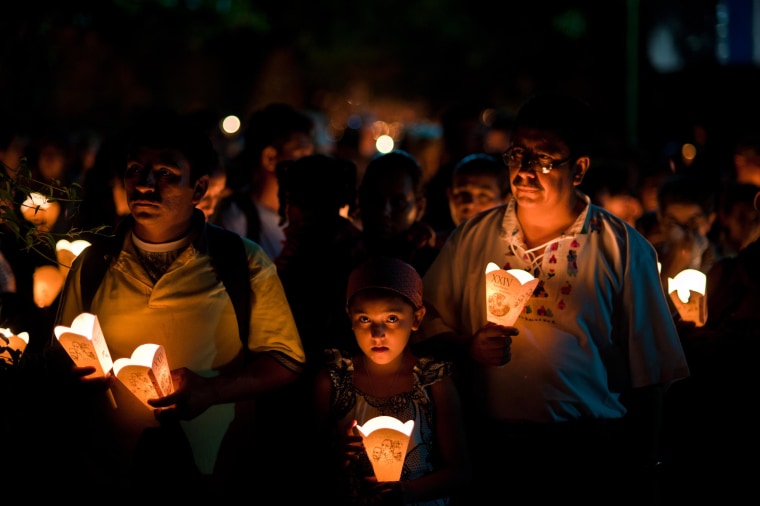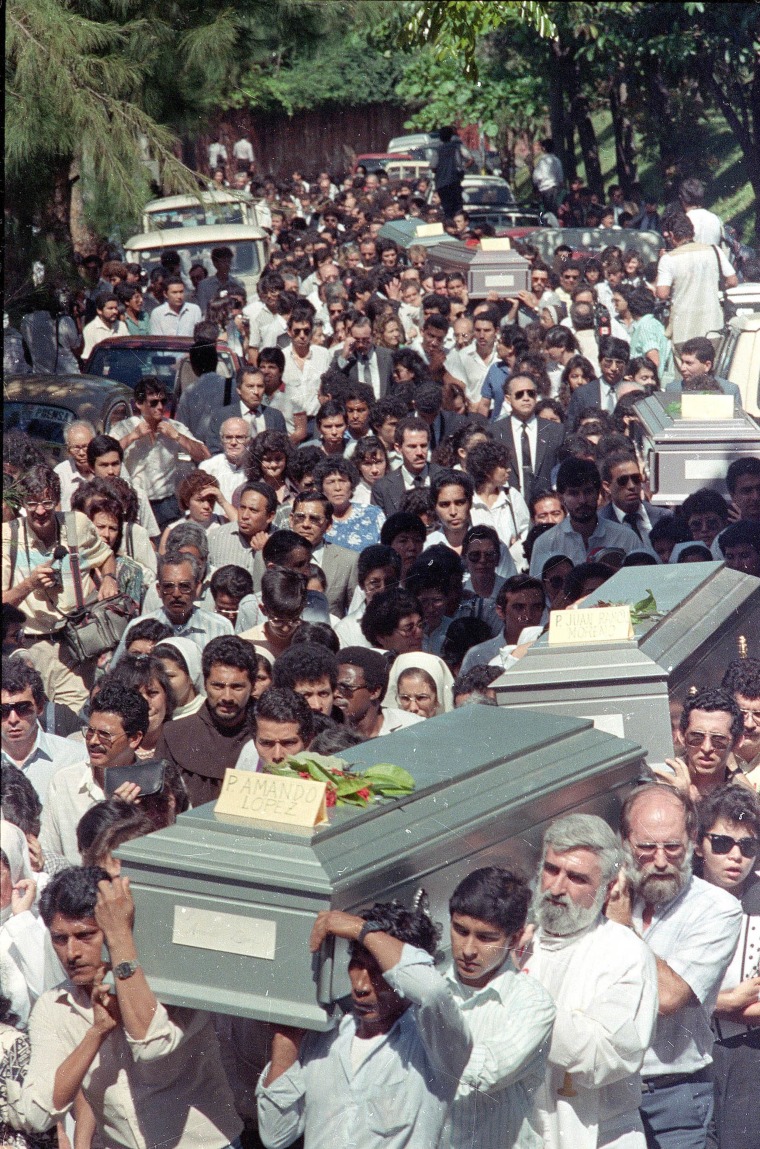Twenty-five years ago this week, armed members of El Salvador’s military burst into the Jesuit residence at the Universidad Centroamericana in San Salvador and executed everyone inside, six Jesuit priests, a housekeeper and her daughter.
The priests were known for speaking out for peaceful negotiations in the nation’s brutal civil war between FMLN rebels and the government. The university had become known for its opposition to human rights abuses committed by the U.S.-backed military, and some in the armed forces thought the priests were tied to the rebels out of their concern for the poor, who suffered the brunt of the effects of the war.
One of the most notorious and heinous crimes of Salvador’s 12-year-long civil war, a conflict that left some 75,000 people dead, the Nov. 16, 1989 massacre rocked the public consciousness, provoking worldwide outrage and marking a turning point in the war, which would end in 1992. The dead became known as “The Martyrs.”
On Thursday, a delegation from the international human rights organization, the San Francisco-based Center for Justice and Accountability (CJA), will arrive in El Salvador, their mission as much to commemorate the 25th anniversary of the Jesuits massacre as it is part of their long quest to uncover the truth about the crimes.

The human rights group has brought a case against a number of Salvadoran former military officers alleged to be behind the Jesuit murders. Prosecution, based on the principle of “universal jurisdiction” in human rights cases, is in Spain because some of the Jesuit priests were Spaniards. CJA is asking El Salvador’s new government to cooperate with the Spanish National Court’s investigation.
For the first time since the civil war accords were signed, the Salvadoran republic is led by a former commander of the FMLN, or Farabundo Marti National Liberation Front, said Almudena Bernabeu, who is the lead prosecutor on CJA’s case in Spain.
It’s urgent to get a sense of where the Salvadoran government stands on human rights, Bernabeu told NBC News. Previous right-wing administrations were not always willing to talk about such things, but she expects the current government will be more open.
“We want to get a sense of their political agendas,” Bernabeu said. “And where they stand on human rights issues, immigration and a lot of problems they need to face that have to do with (war) victims, reparations, and other related issues.”
“It was a horrible war," said Almudena Bernabeu, lead prosecutor of the case in Spain against former military officers alleged to be behind the murders. "When the Jesuits were killed, it was one of the most horrible moments, almost like a punch in the stomach. After all that suffering, all those attempts to end the war, the Jesuits were killed.”
She is hopeful El Salvador will cooperate with the Spanish court’s investigation as well as with a request to extradite a former high military commander, Inocente Montano, to Spain for prosecution. Montano is currently jailed in the U.S. for immigration violations.
“I think they will be sympathetic to Montano’s extradition. And I think that will be huge,” Bernabeu said.
El Salvador has not so much healed since the civil war as it has evolved, she said.
There is some reconciliation, mostly in symbolic images, such as those of Monsignor Carlos Romero, the archbishop of San Salvador who was assassinated during the war and whose likeness can be seen everywhere in the city.
But there are other concrete examples, too, Bernabeu said, like military records being disclosed and more investigations into the thousands of disappearances of people during the war. “There is a lot to do,” Bernabeu said. “But there is an opening. Something is shaking for sure.”
Commemoration of the massacre will be a somber reflection. The CJA delegation will attend an evening Mass Saturday in honor of the Jesuit priests at the UCA, preceded by a candlelight procession along university streets.
On Friday, the delegation is scheduled to meet with Sánchez Serén, El Salvador’s newly elected president.
Bernabeu expects the trip will be deeply moving. The killings of the Jesuit priests shocked Americans in a way not seen before, she said.
“Everybody remembers the killings,” Bernabeu added. “American society was extremely invested in what was happening in El Salvador. People in the universities, progressives, people who opposed U.S. foreign policy in El Salvador for financially supporting the armed forces.
“It was a horrible war. When the Jesuits were killed, it was one of the most horrible moments, almost like a punch in the stomach. After all that suffering, all those attempts to end the war, the Jesuits were killed.”
